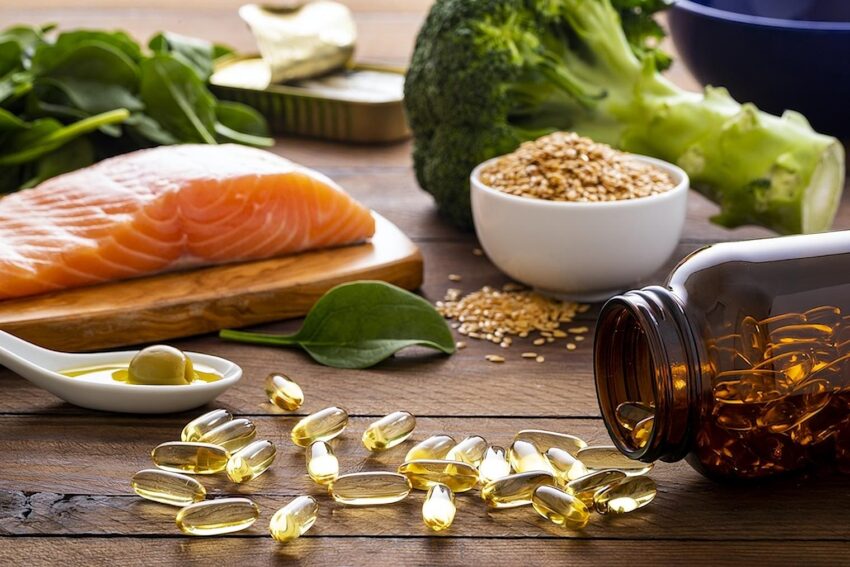Omega-3 fatty acids are essential for multiple functions in the human body. Not only do they benefit cardiovascular and brain health, but they also regulate inflammation, strengthen the immune system, and contribute to metabolic balance. Their impact on health is so broad that their deficiency has been associated with chronic diseases such as systemic inflammation, neurodegenerative disorders, and metabolic problems.
Anti-inflammatory properties and health benefits
The Omega-3 play a key role in modulating the body's inflammatory response. When you consume them, your body converts them into Specialized Pro-Resolution Mediators (SPMs), compounds that help regulate inflammation and promote cellular homeostasis.
How do Omega-3s help your health?
Protect the cardiovascular system: They reduce triglycerides, regulate blood pressure and improve circulation.
Reduce chronic inflammation: They help with inflammatory conditions such as arthritis, metabolic syndrome and autoimmune diseases.
Improve brain function: They promote memory, concentration and reduce the risk of cognitive decline.
Promote eye health: They maintain ocular hydration and prevent macular degeneration.
Regulate the mood: They contribute to the production of neurotransmitters such as serotonin, reducing anxiety and depression.
Support metabolic balance: They improve insulin sensitivity and can promote the loss of body fat.
Promote muscle recovery and well-being: They reduce post-exercise inflammation and protect against muscle breakdown.
Natural sources of Omega-3
It is ideal to obtain Omega-3 from natural sources, as these foods also contain other essential nutrients that enhance their absorption and benefits.
Animal Sources (EPA and DHA)
They are the most bioavailable and effective for the body.
Fatty fish:
- Wild Salmon: Rich in EPA and DHA, as well as vitamin D.
- Sardines: One can provides up to 1,700 mg of Omega-3.
- Mackerel and herring: Exceptional for cardiovascular health and cognitive function.
- Anchovies: High in Omega-3 and low in contaminants.
- Wild trout: Good alternative to vary the diet.
Caution: Some fish may contain mercury. Prioritize options wild and sustainably caught, or choose purified supplements.
Plant Sources (ALA)
If you follow a vegetarian or vegan diet, there are alternatives such as:
Chia and flax seeds: Rich in alpha-linolenic acid (ALA), although its conversion to EPA and DHA is limited (1-5%).
Walnuts: They provide ALA, in addition to antioxidants.
Flaxseed and walnut oil: Ideal for dressings in cold dishes.
Algae oil: Highly bioavailable source of DHA, free of contaminants and suitable for vegans.
Omega-3 from plant or animal sources?
There are three main types of Omega-3 in food:
- EPA (eicosapentaenoic acid): Anti-inflammatory key in cardiovascular and immune health.
- DHA (docosahexaenoic acid): Essential for the brain, eyes and nervous system.
- ALA (alpha-linolenic acid): Present in plants, but needs to be converted into EPA and DHA, with a low conversion rate.
If you eat fish regularly, you get EPA and DHA directly. If you are vegan or vegetarian, algal oil is the best source for DHA.
How much Omega-3 do you need?
Needs vary depending on age, lifestyle and overall health.
- Recommended dosage: 1,000 – 2,000 mg of combined EPA and DHA per day.
- Therapeutic dose: Up to 4 grams daily in cases of chronic inflammation, cardiovascular diseases or neurodegenerative risk.
- Minimum dose for general benefits: At least 250 – 500 mg of EPA and DHA daily.
Omega-3 Supplementation: Is It Necessary?
If you don't consume enough fish or plant sources rich in Omega-3, supplements may be a great option.
Types of supplements and their benefits
Fish oil: Rich in EPA and DHA, ideal for cardiovascular health and inflammation.
Krill oil: Better absorption thanks to its phospholipid structure, with astaxanthin as an antioxidant.
Algae oil: High quality vegan option, rich in DHA.
ALA (flaxseed, chia, walnuts): Less efficient, but useful as a complement.
How to choose a quality supplement
Certified purity: Make sure it is free of contaminants such as mercury and PCBs. Look for certifications such as IFOS or GOED.
High concentration of EPA and DHA: Don't be guided by the total amount of fish oil; check the actual amount of EPA and DHA in each capsule.
Suitable molecular form: Prefers reesterified triglycerides instead of ethyl esters, as they are more bioavailable.
Ideal time to take Omega-3
Omega-3s are fats and their absorption is improved if you take them with a meal containing other healthy fats. This optimizes their bioavailability and prevents digestive discomfort. If you are looking for anti-inflammatory benefits, take them daily. If you take a high dose, divide it into several doses per day.
